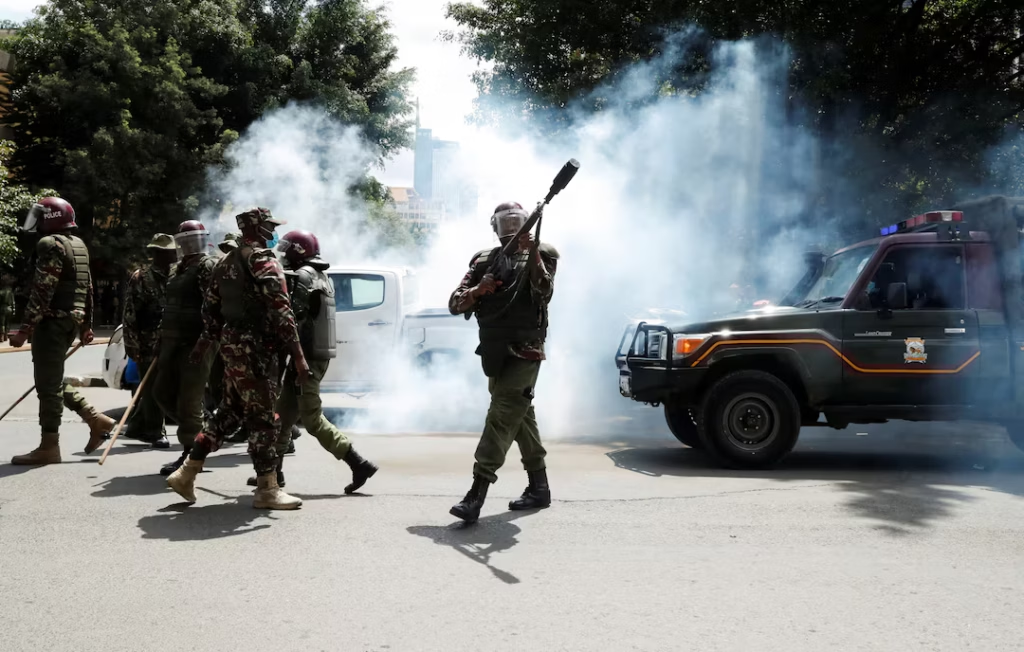NAIROBI, Kenya (BN24)— Kenyan police fired teargas at protesters in Nairobi on Tuesday as public anger erupted over the death of blogger Albert Ojwang, whose passing in police custody has intensified accusations of extrajudicial killings by security forces.

Violent clashes unfolded in downtown Nairobi as unidentified men on motorbikes—some hooded—attacked protesters, dispersing crowds in chaotic scenes captured by local broadcaster NTV. The bikers were heard shouting, “No protests,” before whipping demonstrators and bystanders alike, according to Amnesty International’s Kenya chapter in a post on X. Reuters said it could not immediately confirm who the motorcyclists were.
The Kenya police spokesperson did not respond to requests for comment on the escalating unrest or the origin of the armed bikers.
The protests, which also spread to Mombasa, Kenya’s second-largest city, were triggered by the death of 31-year-old teacher and blogger Albert Ojwang, who died just two days after being arrested earlier this month. Police initially claimed he had died by suicide while in custody.
However, a subsequent independent autopsy revealed signs of assault, contradicting the official account and prompting national outrage. Police Inspector General Japhet Koome later issued a public apology, while President William Ruto called Ojwang’s death “heartbreaking and unacceptable,” admitting he had died “at the hands of the police.”
Ojwang was arrested after Kenya’s deputy police chief Eliud Lagat lodged a formal complaint against him, prompting a criminal probe by the Independent Policing Oversight Authority (IPOA). His death has quickly become a flashpoint in a broader debate over police accountability, especially in light of a pattern of brutality documented in recent years.
Protesters in both Nairobi and Mombasa held placards reading, “Stop killing us” and “Ruto must stop killing us,” in an appeal to the president to rein in police excesses. Demonstrations last week in the capital saw vehicles set ablaze and more teargas deployed by riot police. It remains unclear who was responsible for setting the vehicles on fire.
Deputy police chief Eliud Lagat announced on Monday that he was stepping aside temporarily pending the results of an ongoing investigation into Ojwang’s death. In a further development, two senior police officers and a CCTV technician allegedly ordered to dismantle surveillance cameras at the station where Ojwang was detained have been arrested in connection with the case.
Rights groups say the latest unrest underscores growing public frustration over persistent abuses by Kenyan security forces, despite repeated government promises to pursue reform. More than 60 people were killed in anti-government protests last year, many of them in police crackdowns on demonstrations over proposed tax hikes.
“This case has become a symbol of what Kenyans see as impunity within the police force,” said a Nairobi-based human rights advocate. “We’re seeing not just anger over one man’s death, but over a system that allows this violence to continue.”
The growing unrest presents a significant challenge for President Ruto, who faces mounting pressure to rein in security forces and demonstrate accountability. While Ruto has publicly condemned Ojwang’s death, critics say statements are not enough, and call for meaningful institutional reform and prosecution of those responsible.
As calls for justice grow louder, protesters vow to continue demonstrating until Ojwang’s killers are held accountable, and broader protections against police abuse are enacted.
Whether the government will address the root causes of the crisis—or continue to respond with force—remains a pressing question in a nation still haunted by a long history of security force impunity.



